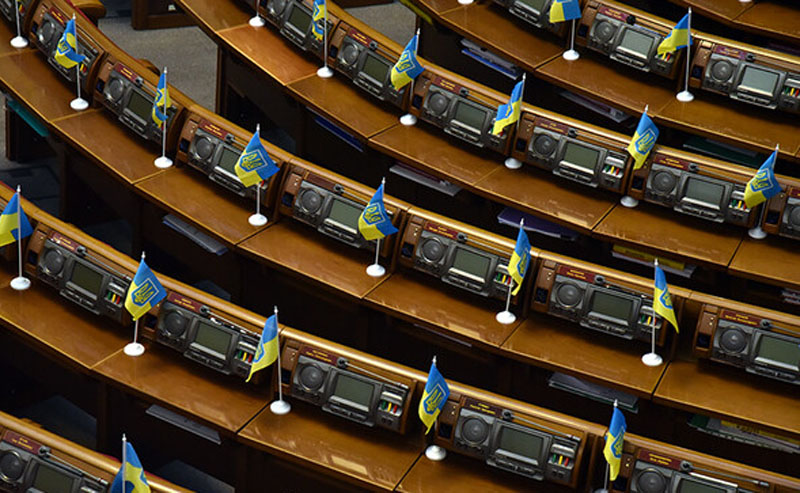Депутатопад во время войны: почему количество народных депутатов уменьшается?


Сейчас в парламенте насчитывается уже 403 депутата — антирекорд за всю историю независимой Украины.
Еще до полномасштабного вторжения 27 мест в Раде были вакантными, ведь общины с мажоритарными округами, где должны были бы избираться 26 депутатов, были оккупированы. Еще на одном округе так и не провели запланированные довыборы — помешало полномасштабное вторжение. Уже после 24.02.2022 количество депутатов снова начало резко падать. На этот раз причин было много: некоторые ушли на государственную службу, некоторые потеряли украинское гражданство, а большое количество членов уже запрещенной ОПЗЖ ушли из Рады якобы по собственному желанию. Сейчас в парламенте насчитывается уже 403 депутата — антирекорд за всю историю независимой Украины. Лаборатория законодательных инициатив же решила спрогнозировать, сколько еще депутатов может выбыть из Верховной Рады и какие последствия это может иметь.
В «зоне риска» мажоритарщики и экс-члены запрещенных партий
Если депутатов лишают мандатов, то почему же на их место не приходят новые? Дело в том, как именно депутат был избран: если по списку партии, тогда его мандат получает следующий человек из списка. Как показывает практика, пополнение депутатов по спискам не является проблемой. Именно это произошло, в частности, в партии «Голос»: на место Рустема Умерова, назначенного в 2022 году председателем Фонда госимущества (с сентября 2023 года Рустем Умеров занимает должность Министра обороны Украины. — Авт.), пришел Максим Хлапук. Значительно сложнее ситуация с «мажоритарщиками». Если такой народный депутат теряет мандат, необходимо проводить выборы в округе, который потерял представителя. Именно здесь проявляется одна из двух главных технических причин резкого падения количества парламентариев: выборы во время военного положения не предусмотрены Конституцией. Поэтому мажоритарщики тянут за собой в политический гроб и свое место в парламенте.
Другая причина — порой списка партии, как и ее самой, больше не существует. Именно это и произошло с ОПЗЖ. Поскольку ее деятельность запрещена на территории Украины, заменить депутатов, которые избирались по ее списку, просто невозможно. Поэтому эти две категории депутатов — мажоритарщики и экс-члены ОПЗЖ — и есть в центре нашего внимания.
Но как именно депутаты могут досрочно потерять мандат? В ст. 81 Конституции Украины прописано несколько причин. На практике же почти все потери мандатов за последние полтора года происходили формально по двум причинам: лишение гражданства и по личному заявлению. Причины потери мандатов депутатов из группы риска с начала полномасштабного вторжения: 11 — по собственному желанию, 6 — потеря гражданства, 1 — получение государственной должности, 2 — смерть.
Сколько нардепов еще могут потерять мандат?
Есть несколько основных причин, по которым депутаты оставляли свои места в Раде раньше. ЛЗИ подсчитала, какое количество депутатов может быть в таких же условиях на данный момент.
Риск №1 — принадлежность к пророссийским политическим силам (-33).
Прежде всего, нельзя не вспомнить о запрещенной ОПЗЖ. Именно выходцы этой партии находятся под особым прицелом. Так, в течение военного положения был инициирован не один законопроект, который имеет целью прекратить полномочия депутатов из этой фракции. Однако все они были отвергнуты как «неконституционные».
Между тем ряды бывшей ОПЗЖ редеют и без конкретных решений «сверху»: например, Татьяна Плачкова сложила свой мандат якобы «по состоянию здоровья», а в некоторых случаях депутаты теряют мандаты и из-за процедуры лишения гражданства. Поэтому именно эти депутаты находятся под особым риском, а потенциальная «Рада будущего» может быть меньше на 33 парламентария, если все бывшие члены ОПЗЖ потеряют мандаты.
Риск №2 — переход на руководящие должности в ВСУ (-1).
Более полугода назад сложил мандат генерал-лейтенант ВСУ Михаил Забродский — он решил сконцентрироваться на работе с Генштабом. Среди мажоритарщиков есть один депутат, который воюет, а именно — подполковник Сергей Рудик из группы «За будущее». С дальнейшим продвижением по службе он, как и его бывший коллега, может больше сконцентрироваться на военном деле — следовательно, количество депутатов может уменьшиться еще на одного.
Риск №3 — вступление в законную силу обвинительного приговора (-16)
Одной из возможных причин потери мандата может быть вступление в законную силу обвинительного приговора. На основе имеющейся в публичном пространстве информации, мы подсчитали депутатов, на которых были открыты уголовные дела в течение последних лет, а также — в отношении кого из народных депутатов было начато досудебное расследование. Таких среди мажоритарщиков (без учета депутатов от ОПЗЖ) мы насчитали 16 парламентариев.
ЛЗИ неоднократно направляла запросы в Офис генерального прокурора с целью получить официальную информацию о количестве народных депутатов, в отношении которых было открыто уголовное производство. К сожалению, в предоставлении информации было отказано. Поэтому эти данные собраны на основе открытых источников.
Риск №4 — прекращение гражданства Украины.
В идеале второе гражданство также должно быть достаточным условием для потери мандата. Но, как показывает опыт, эту карту разыгрывают только тогда, когда это удобно — истории Вадима Рабиновича и Игоря Васильковского являются прекрасной иллюстрацией. Однако эту категорию мы к анализу не брали: найти информацию такого рода из открытых источников почти невозможно, да и в самой Раде на это не слишком обращают внимание.
Учитывая все эти риски, можно сделать предположение, кто является следующим потенциальным депутатом «на выход». Фул-хаус собрал нардеп Вадим Столар. Он принадлежал к т. н. Батальону «Монако», имеет на своем счету несколько уголовных производств, к нему наведывалась СБУ с обыском, он принадлежал к ОПЗЖ. И даже больше: ранее уже ходили слухи, что он будет складывать мандат.
Является ли уменьшение количества народных депутатов критическим для текущего созыва?
После введения военного положения вырос запрос на очищение парламента от предателей и коррупционеров. Вместе с тем, их замена иногда невозможна. Учитывая все перечисленные риски, сейчас минимальное возможное количество депутатов — 353. Однако в любой момент могут появиться новые уголовные производства и ротации в Правительстве. Чем это опасно?
Есть несколько порогов количества голосов, которые Рада должна достичь для полноценного выполнения своей работы. Это — 1) 226 для принятия законов, 2) 300 для изменений в Конституцию и 3) 338 — для импичмента президента. Вероятно, до таких показателей ІХ созыв не упадет и парламент все же сможет продолжать работу.
Хотя проблем все равно не избежать: как заявил первый заместитель Председателя Верховной Рады Александр Корниенко, «это первая Рада, в которой нет 10% депутатов, и тоже надо понимать, что это влияет на комитеты, где не так много людей… Там хуже с кворумом теперь». Итак, способность парламента принимать решения непременно снизится, и чем меньше будет депутатов — тем более явной будет становиться эта проблема.
Есть и другое измерение этой истории. Важна судьба не только отдельных депутатов, но и политических сил, в которые они входят. Для формирования в парламенте фракции или группы необходимо минимум 17 депутатов. Уже сейчас есть три группы депутатов, чей состав равен этому минимуму: «Восстановление Украины», «За будущее» и «Доверие». Однако если разбить по фракциям «рисковых» депутатов, то можно увидеть, что все четыре депутатские группы, которые есть в Раде, могут прекратить свое существование.
В таком случае может измениться конфигурация депутатских групп: при полной вычистке «рисковых депутатов», из экс-членов этих политических сил останется еще 33 депутата — этого почти достаточно, чтобы создать еще две группы. Вместе с тем, в парламенте еще будут оставаться 20 внефракционных депутатов, которых могут использовать как дополнительных лиц для перекрытия возможной недостачи.
Еще один риск, которому подвергается Парламент, — потеря монобольшинства. «Слуга народа» в ответ на громкие скандалы членов коалиции просто исключает их из рядов фракции. Именно это произошло в августе с Анатолием Гунько и Богданом Торохтием. Что характерно, Давид Арахамия, комментируя исключение Торохтия, прямо заявил, что «здесь есть некоторые попытки манипулировать ситуацией, чтобы еще больше уменьшить нашу фракцию».
То есть опасность если не распада, то, как минимум, критического уменьшения монобольшинства уже предчувствуется и самим главой фракции. Сейчас в правящей фракции есть 235 депутатов, если же отнять еще шесть, выделенных нами, — останется всего 229. То есть еще четыре скандала будут отделять «Слугу народа» от необходимости создавать коалицию, объединяясь с другой фракцией, или искать другие пути пополнения фракции — «вербовать» внефракционных депутатов или возвращать «бывших».
Постоянное уменьшение количества народных депутатов больше всего напоминает цугцванг — ситуацию на шахматной доске, когда каждый следующий ход лишь ухудшает существующую ситуацию. Общество требует резкого ответа на любые скандалы, в которые попадают народные избранники. Если ответа не будет — «злоумышленник» останется при привилегиях, на которые он, возможно, не заслуживает. Если же тот потеряет мандат — проблема (не)набора голосов будет становиться все более явной. Возможно, именно с нежеланием терять дееспособность Рады связано такое затянутое промедление с лишением мандатов депутатов от уже давно запрещенной ОПЗЖ. Все-таки они стали удобным рычагом в руках власти, честно играя свою роль пешек.
Recent Posts
Сбежавший в Швейцарию блогер Станислав Домбровский просит прощения у украинцев
Одесский трэш блогер Стас Домбровский, который в последнее время проживает в Швейцарии, записал видеообращение к…
Александра Устинова и атака на руководство АОЗ: что стоит за волной критики
Александра Устинова, народная депутат, которая в последние дни активно атакует Агентство оборонных закупок (АОЗ) возможно…
Журналисты показали имение киевской судьи, закрывшей дело Приходько
Свобода "под ключ" или манипуляция правосудием? Борис Приходько – нацбанкир времен Януковича и действующий нардеп…
Судьи вне закона
В течение последних трех лет внимание общественности если и бывает приковано к судам, то гораздо…
Артем Ляшанов и bill_line спасают репутацию через суд
Финтех-компания столкнулась с обвинениями в отмывании денег игорной мафии. ООО «Тех-Софт Атлас» (ТМ «bill_line») и…
Криптобиржа WhiteBIT: как Владимир Носов и «регионалы» Шенцевы отмывают деньги и помогают спецслужбам России
Владимир Носов в Украине пытается позиционировать себя как респектабельный бизнесмен и хозяин криптобиржи WhiteBIT. Однако…


